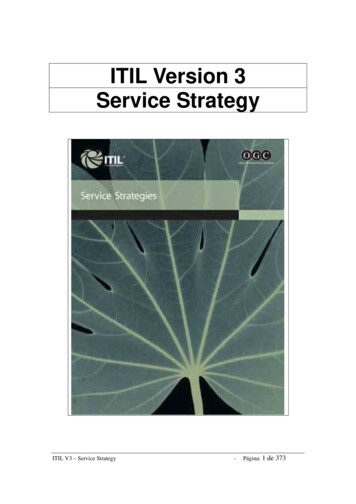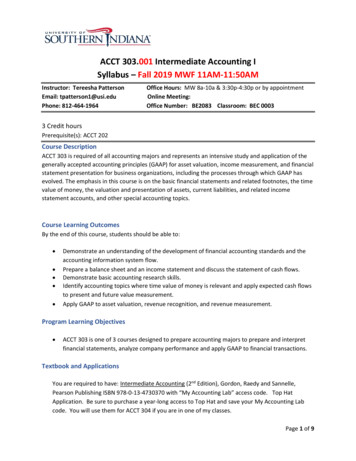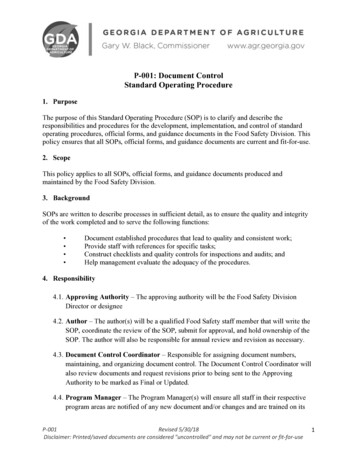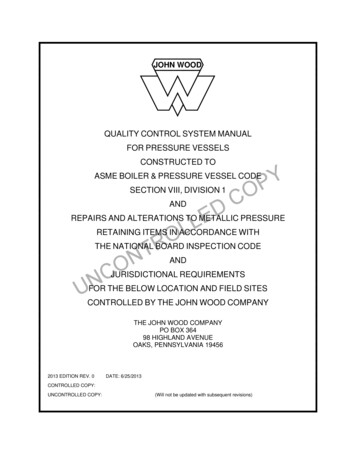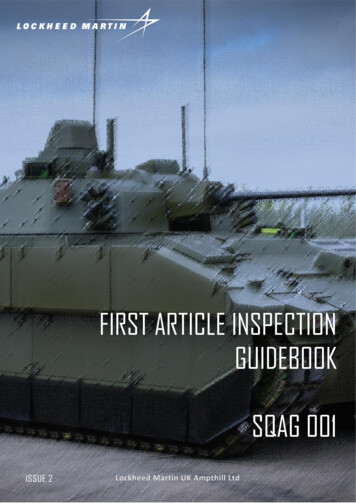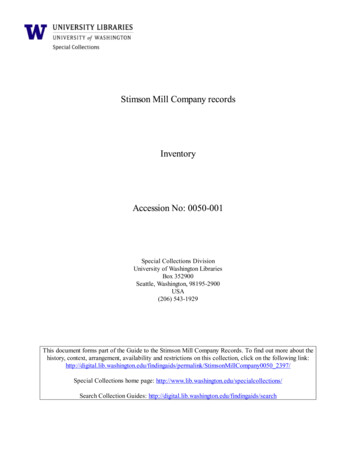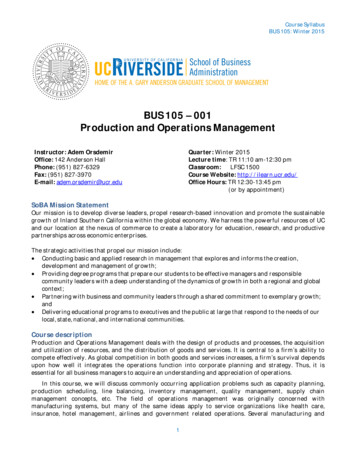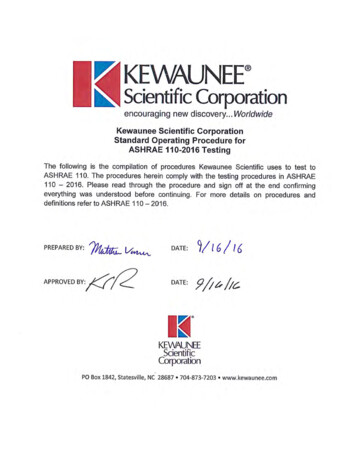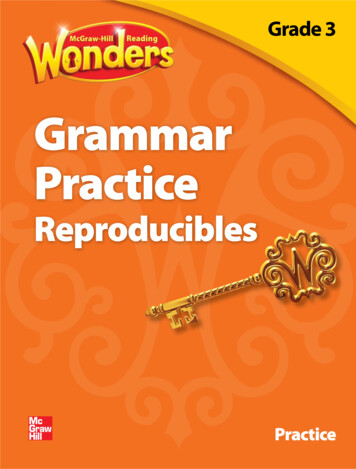
Transcription
Grade 3GrammarPracticeReproduciblesPractice
Copyright The McGraw-Hill Companies, Inc. Permission is granted to reproduce for classroom use.Grade 3GrammarPracticeReproduciblesPractice
Grade 3GrammarPracticeReproduciblesBothell, WA Chicago, IL Columbus, OH New York, NY
www.mheonline.com/readingwondersCopyright The McGraw-Hill Companies, Inc.All rights reserved. The contents, or parts thereof, may bereproduced in print form for non-profit educational use withReading Wonders, provided such reproductions bear copyrightnotice, but may not be reproduced in any form forany other purpose without the prior written consent of TheMcGraw-Hill Companies, Inc., including, but not limited to,network storage or transmission, or broadcast for distancelearning.Send all inquiries to:McGraw-Hill EducationTwo Penn PlazaNew York, NY 10121C
ContentsUnit 1 Growing and LearningStorytimeSentences and Fragments . . . . . . . . . . . . . . . . . . . .Sentences and Fragments . . . . . . . . . . . . . . . . . . . .Mechanics . . . . . . . . . . . . . . . . . . . . . . . . . . . . . . . . . . .Proofreading . . . . . . . . . . . . . . . . . . . . . . . . . . . . . . . . .Test: Sentences and Fragments . . . . . . . . . . . . . . .12345TraditionsCommands and Exclamations . . . . . . . . . . . . . . . . . 6Commands and Exclamations . . . . . . . . . . . . . . . . . 7Mechanics . . . . . . . . . . . . . . . . . . . . . . . . . . . . . . . . . . . 8Proofreading . . . . . . . . . . . . . . . . . . . . . . . . . . . . . . . . . 9Test: Commands and Exclamations . . . . . . . . . . . 10CommunitiesSubjects . . . . . . . . . . . . . . . . . . . . . . . . . . . . . . . . . . . .Subjects . . . . . . . . . . . . . . . . . . . . . . . . . . . . . . . . . . . .Mechanics . . . . . . . . . . . . . . . . . . . . . . . . . . . . . . . . . .Proofreading . . . . . . . . . . . . . . . . . . . . . . . . . . . . . . . .Test: Subjects . . . . . . . . . . . . . . . . . . . . . . . . . . . . . . .1112131415Predicates . . . . . . . . . . . . . . . . . . . . . . . . . . . . . . . . . .Predicates . . . . . . . . . . . . . . . . . . . . . . . . . . . . . . . . . .Mechanics . . . . . . . . . . . . . . . . . . . . . . . . . . . . . . . . . .Proofreading . . . . . . . . . . . . . . . . . . . . . . . . . . . . . . . .Test: Predicates . . . . . . . . . . . . . . . . . . . . . . . . . . . . .1617181920Simple and Compound Sentences . . . . . . . . . . . .Simple and Compound Sentences . . . . . . . . . . . .Mechanics . . . . . . . . . . . . . . . . . . . . . . . . . . . . . . . . . .Proofreading . . . . . . . . . . . . . . . . . . . . . . . . . . . . . . . .Test: Simple and Compound Sentences . . . . . . .2122232425Copyright The McGraw-Hill Companies, Inc.InventionsTIME For Kidsiii
ContentsContentsUnit 2 Figure It OutCooperationKinds of Nouns . . . . . . . . . . . . . . . . . . . . . . . . . . . . . .Kinds of Nouns . . . . . . . . . . . . . . . . . . . . . . . . . . . . . .Mechanics . . . . . . . . . . . . . . . . . . . . . . . . . . . . . . . . . .Proofreading . . . . . . . . . . . . . . . . . . . . . . . . . . . . . . . .Test: Kinds of Nouns . . . . . . . . . . . . . . . . . . . . . . . . .2627282930Singular and Plural Nouns . . . . . . . . . . . . . . . . . . . .Singular and Plural Nouns . . . . . . . . . . . . . . . . . . . .Mechanics . . . . . . . . . . . . . . . . . . . . . . . . . . . . . . . . . .Proofreading . . . . . . . . . . . . . . . . . . . . . . . . . . . . . . . .Test: Singular and Plural Nouns . . . . . . . . . . . . . . .3132333435Special Nouns . . . . . . . . . . . . . . . . . . . . . . . . . . . . . . .Special Nouns . . . . . . . . . . . . . . . . . . . . . . . . . . . . . . .Mechanics . . . . . . . . . . . . . . . . . . . . . . . . . . . . . . . . . .Proofreading . . . . . . . . . . . . . . . . . . . . . . . . . . . . . . . .Test: Special Nouns . . . . . . . . . . . . . . . . . . . . . . . . .3637383940Combining Sentences . . . . . . . . . . . . . . . . . . . . . . . .Combining Sentences . . . . . . . . . . . . . . . . . . . . . . . .Mechanics . . . . . . . . . . . . . . . . . . . . . . . . . . . . . . . . . .Proofreading . . . . . . . . . . . . . . . . . . . . . . . . . . . . . . . .Test: Combining Sentences . . . . . . . . . . . . . . . . . . .4142434445Possessive Nouns . . . . . . . . . . . . . . . . . . . . . . . . . . .Possessive Nouns . . . . . . . . . . . . . . . . . . . . . . . . . . .Mechanics . . . . . . . . . . . . . . . . . . . . . . . . . . . . . . . . . .Proofreading . . . . . . . . . . . . . . . . . . . . . . . . . . . . . . . .Test: Possessive Nouns . . . . . . . . . . . . . . . . . . . . . t The McGraw-Hill Companies, Inc.Figure It Out
Unit 3 One of a KindBe UniqueAction Verbs . . . . . . . . . . . . . . . . . . . . . . . . . . . . . . . .Action Verbs. . . . . . . . . . . . . . . . . . . . . . . . . . . . . . . . .Mechanics . . . . . . . . . . . . . . . . . . . . . . . . . . . . . . . . . .Proofreading . . . . . . . . . . . . . . . . . . . . . . . . . . . . . . . .Test: Action Verbs . . . . . . . . . . . . . . . . . . . . . . . . . . .5152535455Subject-Verb Agreement . . . . . . . . . . . . . . . . . . . . .Subject-Verb Agreement . . . . . . . . . . . . . . . . . . . . .Mechanics . . . . . . . . . . . . . . . . . . . . . . . . . . . . . . . . . .Proofreading . . . . . . . . . . . . . . . . . . . . . . . . . . . . . . . .Test: Subject-Verb Agreement . . . . . . . . . . . . . . . .5657585960Past-Tense Verbs . . . . . . . . . . . . . . . . . . . . . . . . . . . .Past-Tense Verbs . . . . . . . . . . . . . . . . . . . . . . . . . . . .Mechanics . . . . . . . . . . . . . . . . . . . . . . . . . . . . . . . . . .Proofreading . . . . . . . . . . . . . . . . . . . . . . . . . . . . . . . .Test: Past-Tense Verbs . . . . . . . . . . . . . . . . . . . . . . .6162636465Future-Tense Verbs . . . . . . . . . . . . . . . . . . . . . . . . . .Future-Tense Verbs . . . . . . . . . . . . . . . . . . . . . . . . . .Mechanics . . . . . . . . . . . . . . . . . . . . . . . . . . . . . . . . . .Proofreading . . . . . . . . . . . . . . . . . . . . . . . . . . . . . . . .Test: Future-Tense Verbs . . . . . . . . . . . . . . . . . . . . .6667686970Combining Sentences with Verbs . . . . . . . . . . . . .Combining Sentences with Verbs . . . . . . . . . . . . .Mechanics . . . . . . . . . . . . . . . . . . . . . . . . . . . . . . . . . .Proofreading . . . . . . . . . . . . . . . . . . . . . . . . . . . . . . . .Test: Combining Sentences with Verbs . . . . . . . .7172737475LeadershipDiscoveriesCopyright The McGraw-Hill Companies, Inc.New IdeasTIME For Kidsv
ContentsContentsUnit 4 Meet the ChallengeChoicesLinking Verbs . . . . . . . . . . . . . . . . . . . . . . . . . . . . . . .Linking Verbs . . . . . . . . . . . . . . . . . . . . . . . . . . . . . . . .Mechanics . . . . . . . . . . . . . . . . . . . . . . . . . . . . . . . . . .Proofreading . . . . . . . . . . . . . . . . . . . . . . . . . . . . . . . .Test: Linking Verbs . . . . . . . . . . . . . . . . . . . . . . . . . .7677787980Contractions with Not . . . . . . . . . . . . . . . . . . . . . . . .Contractions with Not . . . . . . . . . . . . . . . . . . . . . . . .Mechanics . . . . . . . . . . . . . . . . . . . . . . . . . . . . . . . . . .Proofreading . . . . . . . . . . . . . . . . . . . . . . . . . . . . . . . .Test: Contractions with Not . . . . . . . . . . . . . . . . . . .8182838485Main and Helping Verbs . . . . . . . . . . . . . . . . . . . . . .Main and Helping Verbs . . . . . . . . . . . . . . . . . . . . . .Mechanics . . . . . . . . . . . . . . . . . . . . . . . . . . . . . . . . . .Proofreading . . . . . . . . . . . . . . . . . . . . . . . . . . . . . . . .Test: Main and Helping Verbs . . . . . . . . . . . . . . . . .8687888990Complex Sentences . . . . . . . . . . . . . . . . . . . . . . . . .Complex Sentences . . . . . . . . . . . . . . . . . . . . . . . . .Mechanics . . . . . . . . . . . . . . . . . . . . . . . . . . . . . . . . . .Proofreading . . . . . . . . . . . . . . . . . . . . . . . . . . . . . . . .Test: Complex Sentences . . . . . . . . . . . . . . . . . . . .9192939495Skills and TalentsAdaptationsFlightIrregular Verbs . . . . . . . . . . . . . . . . . . . . . . . . . . . . . . 96Irregular Verbs . . . . . . . . . . . . . . . . . . . . . . . . . . . . . . 97Mechanics . . . . . . . . . . . . . . . . . . . . . . . . . . . . . . . . . . 98Proofreading . . . . . . . . . . . . . . . . . . . . . . . . . . . . . . . . 99Test: Irregular Verbs . . . . . . . . . . . . . . . . . . . . . . . . 100viCopyright The McGraw-Hill Companies, Inc.Inspiration
Unit 5 Take ActionLet’s Trade!Singular and Plural Pronouns . . . . . . . . . . . . . . . .Singular and Plural Pronouns . . . . . . . . . . . . . . . .Mechanics . . . . . . . . . . . . . . . . . . . . . . . . . . . . . . . . .Proofreading . . . . . . . . . . . . . . . . . . . . . . . . . . . . . . .Test: Singular and Plural Pronouns . . . . . . . . . . .101102103104105Subject and Object Pronouns . . . . . . . . . . . . . . . .Subject and Object Pronouns . . . . . . . . . . . . . . . .Mechanics . . . . . . . . . . . . . . . . . . . . . . . . . . . . . . . . .Proofreading . . . . . . . . . . . . . . . . . . . . . . . . . . . . . . .Test: Subject and Object Pronouns . . . . . . . . . . .106107108109110Pronoun-Verb Agreement . . . . . . . . . . . . . . . . . . .Pronoun-Verb Agreement . . . . . . . . . . . . . . . . . . .Mechanics . . . . . . . . . . . . . . . . . . . . . . . . . . . . . . . . .Proofreading . . . . . . . . . . . . . . . . . . . . . . . . . . . . . . .Test: Pronoun-Verb Agreement . . . . . . . . . . . . . .111112113114115Possessive Pronouns . . . . . . . . . . . . . . . . . . . . . . .Possessive Pronouns . . . . . . . . . . . . . . . . . . . . . . .Mechanics . . . . . . . . . . . . . . . . . . . . . . . . . . . . . . . . .Proofreading. . . . . . . . . . . . . . . . . . . . . . . . . . . . . . . .Test: Possessive Pronouns . . . . . . . . . . . . . . . . . .116117118119120Pronoun-Verb Contractions . . . . . . . . . . . . . . . . . .Pronoun-Verb Contractions . . . . . . . . . . . . . . . . . .Mechanics . . . . . . . . . . . . . . . . . . . . . . . . . . . . . . . . .Proofreading . . . . . . . . . . . . . . . . . . . . . . . . . . . . . . .Test: Pronoun-Verb Contractions . . . . . . . . . . . . .121122123124125Reuse and RecycleTeaming UpCopyright The McGraw-Hill Companies, Inc.Good CitizensTIME For Kidsvii
ContentsContentsUnit 6 Think It OverTreasuresAdjectives and Articles . . . . . . . . . . . . . . . . . . . . . .Adjectives and Articles . . . . . . . . . . . . . . . . . . . . . .Mechanics . . . . . . . . . . . . . . . . . . . . . . . . . . . . . . . . .Proofreading . . . . . . . . . . . . . . . . . . . . . . . . . . . . . . .Test: Adjectives and Articles . . . . . . . . . . . . . . . . .126127128129130Adjectives That Compare . . . . . . . . . . . . . . . . . . . .Adjectives That Compare . . . . . . . . . . . . . . . . . . . .Mechanics . . . . . . . . . . . . . . . . . . . . . . . . . . . . . . . . .Proofreading . . . . . . . . . . . . . . . . . . . . . . . . . . . . . . .Test: Adjectives That Compare . . . . . . . . . . . . . . .131132133134135Adverbs . . . . . . . . . . . . . . . . . . . . . . . . . . . . . . . . . . .Adverbs . . . . . . . . . . . . . . . . . . . . . . . . . . . . . . . . . . .Mechanics . . . . . . . . . . . . . . . . . . . . . . . . . . . . . . . . .Proofreading . . . . . . . . . . . . . . . . . . . . . . . . . . . . . . .Test: Adverbs . . . . . . . . . . . . . . . . . . . . . . . . . . . . . .136137138139140Adverbs That Compare . . . . . . . . . . . . . . . . . . . . . .Adverbs That Compare . . . . . . . . . . . . . . . . . . . . . .Mechanics . . . . . . . . . . . . . . . . . . . . . . . . . . . . . . . . .Proofreading . . . . . . . . . . . . . . . . . . . . . . . . . . . . . . .Test: Adverbs That Compare . . . . . . . . . . . . . . . .141142143144145Prepositions . . . . . . . . . . . . . . . . . . . . . . . . . . . . . . .Prepositions . . . . . . . . . . . . . . . . . . . . . . . . . . . . . . .Mechanics . . . . . . . . . . . . . . . . . . . . . . . . . . . . . . . . .Proofreading . . . . . . . . . . . . . . . . . . . . . . . . . . . . . . .Test: Prepositions . . . . . . . . . . . . . . . . . . . . . . . . . .146147148149150WeatherLearning to SucceedAnimals and YouviiiCopyright The McGraw-Hill Companies, Inc.Funny Times
Grammar: Sentences and Sentence FragmentsName A sentence is a group of words that shows a complete thought. A sentence fragment is a group of words that does not showa complete thought. Every sentence begins with a capital letter. Most sentences end in a period. The period is called endpunctuation.Read each group of words. Write yes if the group of words forms asentence. Write no if it does not form a sentence.1. I read a book about sea life.2. The largest mammal.3. I want to see a whale some day.Copyright The McGraw-Hill Companies, Inc.4. Swims quickly through the water.5. A jellyfish is an interesting sea creature.6. Most sharks live in warm water.7. A giant squid can grow to be very large.8. Live off the coast of Japan.9. Dolphins have two flippers.10. A walrus can live in or out of the water.Grammar Grade 3 Unit 1 Week 11
Grammar: Statements and QuestionsName A statement, or declarative sentence, tells something. It ends ina period. A question, or interrogative sentence, asks something. It ends ina question mark.Write statement if the sentence tells something. Write question if itasks something. Put the correct end mark at the end of the sentence.1. We learned about fire safety at school today2. It is important to have fire alarms that work3. Do you check your fire alarms each year4. Kids should only cook with an adult nearby5. Families should plan escape routes from their home6. Do firefighters teach safety classes at your school8. People should not leave matches where children can reach them9. Do you know all the fire safety rules10. Next week our class will visit the fire station2Grammar Grade 3 Unit 1 Week 1Copyright The McGraw-Hill Companies, Inc.7. Sometimes lightning can start a fire
Grammar: Capitalization and PunctuationName Begin every sentence with a capital letter. Use a period at the end of a statement. Use a question mark at the end of a question.Write each sentence correctly using capital letters and endpunctuation. If the group of words does not tell a complete thought,place an X next to it. Then add words to make it a sentence and writeit on the line.1. fall is my favorite time of year2. i like to see the leaves turn bright colorsCopyright The McGraw-Hill Companies, Inc.3. pumpkins at the pumpkin patch4. do you go to football games in the fall5. my dad takes lots of pictures of the colorful leavesGrammar Grade 3 Unit 1 Week 13
Grammar: ProofreadName Begin every sentence with a capital letter. A statement is a sentence that tells something. It ends in a period. A question is a sentence that asks something. It ends ina question mark.Rewrite the sentences below, fixing any mistakes you might find.1. we had a terrible storm last night.2. There was a lot of wind and heavy rain?3. did you see the weather report this morning4. The reporter said that our town got over three inches of rain4 Grammar Grade 3 Unit 1 Week 1Copyright The McGraw-Hill Companies, Inc.5. Do you think that some streets are flooded.
Grammar: Sentences and FragmentsNameA. Circle the sentences. Place an X over sentence fragments.1. a. The store will not open until noon today.b. We saw a plane take off and land.c. Under a long table.d. The kitten fell asleep on the pillow.2. a. He painted a picture of the ship.b. The mayor of Greenville.c. We saw a movie about an elephant family.d. Won first prize in the contest.Copyright The McGraw-Hill Companies, Inc.B. Decide if the sentence is a statement or a question. Writeyour answer on the line. Rewrite the sentence using the correctpunctuation and capitalization.3. did you study for the spelling test4. we are going to a soccer game after school5. will you help out with the bake sale this yearGrammar Grade 3 Unit 1 Week 15
Grammar: CommandsName A sentence is a group of words that expresses a completethought. Remember that a statement tells something. A question askssomething. A command is a sentence that tells someone to do something.It ends with a period. The word you is understood at the beginning of a command.After each sentence, write statement, question, or command for thekind of sentence it is. Then write the sentence correctly. Use capitalletters and end marks.1. we can help you put the groceries away2. put the cans of food on the shelves4. where should I put the flour and sugar5. close the door when you are finished6Grammar Grade 3 Unit 1 Week 2Copyright The McGraw-Hill Companies, Inc.3. do you want me to put the apples in the bowl
Grammar: ExclamationsName A command is a sentence that tells someone to do something.It ends with a period. An exclamation, or exclamatory sentence, is a sentence thatshows excitement or strong feeling. It ends with an exclamationmark.After each sentence, write statement, question, command, orexclamation for the kind of sentence it is. Place the correctpunctuation at the end of the sentence.1. I want to go to Florida next summer2. What a beautiful state it is3. Have you ever been there4. Wow, my grandmother sent me a free ticketCopyright The McGraw-Hill Companies, Inc.5. Go with me to Miami6. The capital of Florida is Tallahassee7. Hey, I’ll send Grandmother a card to thank her8. Where is the address book9. I cannot wait to go see her10. Do you think she will like the cardGrammar Grade 3 Unit 1 Week 27
Grammar: Punctuation in Commands and ExclamationsName Use a period at the end of a statement. Use a question mark at the end of a question. Use a period at the end of a command. Use an exclamation mark at the end of an exclamation.Rewrite the letter from Carly, adding correct punctuation to the endof each sentence.Dear Aunt Jackie,Wow, I was so happy to hear your good newsIt will be fun to readyour poem in the magazineMom says we can cut it out and put it ina frameWill you get extra copiesSend me an extra one, pleaseI want to take it to school to show my classThey will see that I havethe best aunt everI have a small favor to askWould you mind giving me some tipson writing a poemFind out if you can come for a visit soonWecan have an amazing poetry reading togetherCarly8Grammar Grade 3 Unit 1 Week 2Copyright The McGraw-Hill Companies, Inc.Your favorite niece,
Grammar: ProofreadName A statement tells something. It ends with a period. A question asks something. It ends with a question mark. A command tells someone to do something. It ends with a period. An exclamation shows excitement or strong feeling. It ends withan exclamation mark.After each sentence, write statement, question, command, orexclamation for the kind of sentence it is. Then write the sentencecorrectly. Use capital letters and end marks.1. what a great day for a parade2. does the parade start at noonCopyright The McGraw-Hill Companies, Inc.3. we can see the parade from Green Street4. walk down Oak Street, then over to the corner of Green andThird5. wow, here come the marching bandsGrammar Grade 3 Unit 1 Week 29
Grammar: Commands and ExclamationsNameA. Write S if the sentence is a statement. Write Q if the sentenceis a question. Write C if the sentence is a command. Write E if thesentence is an exclamation. Place the correct punctuation at the endof each sentence.1.My dad collects clocks2.Do you collect anything3.Wow, it would be fun to collect autographs4.Write down your favorite hobbies5.I can’t believe Dad has over one hundred clocksB. Write if the sentence is a command or an exclamation. Then rewritethe sentence using the correct punctuation and capitalization.6. oh no, Mom can’t find her keys8. search under the car seat9. we just can’t be late today10. wow, I found the keys in the toy box10Grammar Grade 3 Unit 1 Week 2Copyright The McGraw-Hill Companies, Inc.7. look on the table
Grammar: SubjectsNameA sentence is a group of words that expresses a complete thought. Every sentence has two parts: the subject and the predicate. The subject tells what or whom the sentence is about. The predicate identifies what the subject does or is. A complete subject is all the words in a subject.What or whom is each sentence about? Draw a line under thecomplete subject.1. The pet store is busy on Saturday.2. People smile at the puppies and kittens.3. The goldfish swim in a big tank.4. Furry rabbits hop around.Copyright The McGraw-Hill Companies, Inc.5. A long snake coils in its cage.6. Pet supplies are on the shelves.7. The owner answers a lot of questions.8. A little boy points to a sleeping puppy.9. The brown puppy wakes up and barks.10. A family buys the puppy and goes home.Grammar Grade 3 Unit 1 Week 311
Grammar: Multiword SubjectsName The subject of a sentence tells what or whom the sentenceis about. A complete subject is all the words in a subject. A complete subject can be one word, more than one word, ora compound subject connected by and.Place a checkmark next to the sentence if it has a compoundsubject. Write the complete subject on the line.1. Jane and Lia rode their bikes to the park.2. Carlos and Shane were playing soccer.3. The sun shone brightly.4. Coach Tate and Chris walked toward the field.5. Mrs. Chan sat on a bench reading.7. Many birds and squirrels live in the park.8. Dark clouds began to gather around noon.9. The adults and children started to leave.10. A cold rain poured down the rest of the day.12Grammar Grade 3 Unit 1 Week 3Copyright The McGraw-Hill Companies, Inc.6. The Smith twins played on the swings.
Grammar: Complete Sentences and FragmentsName Every complete sentence has a subject and a predicate.It expresses a complete thought. A fragment may be a sentence that does not have a subject.It does not express a complete thought. Correct some sentence fragments by adding a subject.Correct each fragment by adding a subject from the box. Then writethe sentence correctly.Copyright The McGraw-Hill Companies, Inc.SkyscrapersA cityA subwayPeopleA park1.is much larger than a town.2.may take subways, trains, or buses to work.3.is a train that goes underground.4.are tall buildings.5.is a great place for families to have a picnic.Grammar Grade 3 Unit 1 Week 313
Grammar: ProofreadName A complete subject is all the words in a subject. It can be oneword, more than one word, or a compound subject connectedby and. A fragment may be a sentence that does not have a subject.It does not express a complete thought. Correct some sentence fragments by adding a subject.Underline the complete subject in each sentence. For sentencefragments, add a subject. Then write the sentence correctly. Usecapital letters and end marks.1. my class will go on a field trip to a museum next week2. a museum is a good place to learn about the past3. can see all kinds of things used long ago5. had not been invented yet14Grammar Grade 3 Unit 1 Week 3Copyright The McGraw-Hill Companies, Inc.4. wagons and buggies were once used for transportation
Grammar: SubjectsNameA. Write the complete subject of each sentence.1. The sun is at the center of our solar system.2. Our Earth gets heat and light from the sun.3. People and animals need energy from the sun’s rays.4. Plants could not live without the sun.5. All living things need the sun to live and grow.B. Choose a subject from the box that best completes each sentence.Rewrite the sentence using the correct punctuation and capitalization.Copyright The McGraw-Hill Companies, Inc.Other good fruitsOrangesFlorida and California6.are a kind of fruit7.are apples, pears, and blueberries.8.are two states that grow oranges.Grammar Grade 3 Unit 1 Week 315
Grammar: PredicatesNameA sentence is a group of words that expresses a complete thought. Every complete sentence has two parts: a complete subject anda complete predicate. The complete subject tells what or whom the sentence is about. The complete predicate tells what a subject is or does. Predicatescan be more than one word.Which word or words tell what the subject is or does? Draw a lineunder the complete predicate.1. Bears live in many different habitats.2. Polar bears live in cold places.3. These bears live on thick ice sheets.4. Heavy fur keeps the polar bear warm.6. The grizzly likes to catch fish to eat.7. Grizzlies hibernate when it gets cold.8. The sun bear is a small bear.9. Sun bears live in warmer climates.10. The sun bear steals honey from beehives.16 Grammar Grade 3 Unit 1 Week 4Copyright The McGraw-Hill Companies, Inc.5. A grizzly bear is large and fierce.
Grammar: Compound PredicatesName The complete predicate tells what a subject is or does. Predicatescan be more than one word. Two predicates joined by the word and form a compoundpredicate.Place a checkmark next to the sentence if it has a compoundpredicate. Write the complete predicate on the line.1. Caleb is baking pies for the bake sale.2. Katya helps peel the apples.3. Mom turns on the oven and bakes the crust.4. Lara wants to make cupcakes.Copyright The McGraw-Hill Companies, Inc.5. She pours in the flour and stirs the batter.6. The cupcakes bake for thirty minutes.7. Nina frosts the cupcakes and decorates them.8. The bake sale begins at noon.9. Dad and Mr. Lee set up the tables.10. We set out the food and wait for the customers.Grammar Grade 3 Unit 1 Week 417
Grammar: Complete SentencesName Every complete sentence has a subject and a predicate.It expresses a complete thought. A fragment does not have both a subject and a predicate. Correcta sentence fragment by adding a subject or a predicate. A run-on sentence joins two sentences that should be separate.Correct a run-on sentence by separating the two ideas into twosentences.Read the sentences. Rewrite each sentence and fix any fragmentsor run-on sentences.1. I like summer I always go camping with my dad.2. First, Dad and I.3. We gather wood for a campfire later we take a swim in the lake.5. We sleep great in the tent we have a big breakfast the next morning.18Grammar Grade 3 Unit 1 Week 4Copyright The McGraw-Hill Companies, Inc.4. In the evening my dad and I.
Grammar: ProofreadName Every complete sentence has a subject and a predicate.Sentences begin with capital letters and end with end punctuation. Correct a sentence fragment by adding a subject or a predicate. Correct a run-on sentence by separating the two ideas into twosentences.Rewrite the paragraphs below. Correct sentence fragments andrun-on sentences. Be sure to use capital letters and end marks.My grandmother is an artist she lives in New York. Paints pictures ofbirds. her paintings are used in books about birds in their natural habitatsSome of her paintings can be seen in museums.Copyright The McGraw-Hill Companies, Inc.My grandmother gets to travel all over the world she has even paintedpenguins in Antarctica. Once Grandmother. climbed a tree to sketch aneagle. I think that my grandmother has the best job in the world I want tohave a job like hers someday.Grammar Grade 3 Unit 1 Week 419
Grammar: PredicatesNameA. Which part of the sentence is the predicate? Circle the correctanswer.1. My mom and I saw the Golden Gate Bridge last summer.a. My mom and Ib. last summerc. saw the Golden Gate Bridge last summer2. The bridge in San Francisco is a famous sight.a. in San Franciscob. is a famous sightc. The bridge3. Thousands of people drive across the bridge every day.a. drive across the bridge every dayb. of peoplec. Thousands4. We took lots of pictures of the famous bridge.a. of picturesb. took lots of pictures of the famous bridgec. the famous bridge5. A desert environmenta. sleep during the day and areactive at night6. many animals of the desertb. are able to store water7. Spiny cactus plantsc. gets little rainfall8.9.10.20Grammar Grade 3 Unit 1 Week 4Copyright The McGraw-Hill Companies, Inc.B. Draw a line to match an incomplete subject with an incompletepredicate. Rewrite each sentence on the lines below using correctpunctuation and capitalization.
Grammar: Simple SentencesName A simple sentence is a group of words that expresses a completethought. Simple sentences include a subject and a predicate. Combining simple sentences can add variety to writing. Two sentences can be combined with a comma and thecoordinating conjunctions and, or, or but.Read each group of words below. Write S if the group of words is asimple sentence. Draw a line between the subject and the predicate.1. My friend Mara likes snow.2. We built a snowman.3. Cold and windy.4. My brother skated on the pond.Copyright The McGraw-Hill Companies, Inc.5. Threw snowballs at us.6. Mara and I hid behind a snow fort.7. Mom called for us.8. She gave us good soup.9. Hot and tasty.10. Then we played games inside.Grammar Grade 3 Unit 1 Week 521
Grammar: Compound SentencesName A compound sentence contains two related sentences joined bythe coordinating conjunctions and, or, or but. These coordinating conjunctions have different functions. And joinsideas; but shows a change in thought; and or offers a choice. Place a comma before and, or, or but in a compound sentence.Read each simple sentence. Combine the sentences to makea compound sentence. Use the coordinating conjunction inparentheses. Write the new sentence on the line.1. Dogs make good pets. Cats are good pets, too. (and)2. Dogs learn tricks easily. Cats are not easy to train. (but)3. You can teach your pet. You ca
Grammar Grade 3 Unit 1 Week 1 3 Grammar: Capitalization and Punctuation Write each sentence correctly using capital letters and end punctuation. If the group of words does not tell a complete thought, place an X next to it. Then add words to make it a sentence and wri
